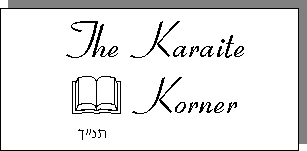

Karaite Fact Sheet What is Karaism?
Karaism is Judaism according to the Hebrew Bible. The word Karaite (Hebrew: Bnei Mikra) means "Followers of the Bible" ("Mikra" is the Hebrew word for Bible). Karaites believe only in the authority of the Hebrew Bible and reject all later innovations such as the Rabbinic "Oral Law".
Biblical Interpretation
Karaites do not take the Bible "literally" since every written work requires interpretation. Instead, Karaism requires that Biblical interpretation strive for the plain meaning of the text, as it would have been understood by the ancient Israelites when it was first given. It is the personal responsibility of every individual to study the Hebrew Scripture and ultimately decide for themselves the correct meaning.
Origins of Karaism
Karaism has been around since the Torah was given on Mt Sinai. It was only in late Second Temple times that other sects appeared and challenged the authority of the Hebrew Bible. The Rabbanites first appear in history only in the 1st century BCE and then only as a minor group. In this period the majority of the People of Israel continued to faithfully follow the Hebrew Bible. It was only through collaboration with the Romans that the Rabbis slowly gained control over Jewish institutions.
Karaism in History
Throughout the Middle Ages Karaites made up about half the Jewish population in many areas including Byzantium, Spain, and Egypt. In some areas Karaites were the majority of the Jewish population such as in Jerusalem (before the Crusades) and Crimea. There were also Karaite communities in Morocco, Iraq, Lithuania, Galicia, and Poland.
Karaism Today
Today there are approximately 30,000 Karaites with some 25,000 Karaites in Israel, 2,500 in the US, and smaller communities in France, Switzerland, Turkey, England, and elsewhere. The main Karaite centers in Israel are located in Ramla, Ashdod, Ofakim, Beersheba, Moshav Ranen, Moshav Masliah, with smaller communities in Jerusalem, Bat Yam, and Arad. The main Karaite center in the US is in San Francisco, which has the only active Karaite synagogue in North America.
Calendar
The Karaite calendar follows the Biblical requirement of fixing the holidays according to the New Moon and Abib. Because of this the Karaite holidays often fall on different days than those of the Rabbanites. The Rabbanites originally followed the same calendar as documented in the Mishnah and only in the 4th century CE replaced it with a pre-calculated calendar.
5 Reasons Why Karaites
Don't Accept the Oral Law
- The Oral Law is not mentioned even once in the entire Tanach (Hebrew Bible).
- When God told Moses to come up to Mount Sinai to receive the tablets He said: "Come up to me into the mountain, and be there: and I will give thee tablets of stone, and a law, and commandments which I have written;" (Ex 24,12). No mention is made of an Oral Law.
- The Tanach reports that the written Torah was both lost and completely forgotten for over 50 years and only rediscovered by the Temple priests (2Ki 22,8; 2Chr 34,15). It is inconceivable that an Oral Law could have been remembered when even the written Law was forgotten.
- The words of the Mishnah and Talmud are clearly the words of men living in the 2nd-5th centuries CE and absent are the familiar Biblical formulae "And the Lord spoke unto Moses saying," and "Thus saith the Lord".
- The Rabbis claim that the "Oral Law" is the official interpretation of the Torah given on Mount Sinai. Yet if one actually looks at the Mishnah and Talmud they are full of the opinions of Rabbis who disagree with each other on almost every issue. The Rabbis explain that whenever there are such disagreements, "both opinions are the words of the living God". Karaites maintain that it is unreasonable to believe that God would contradict Himself.